
Publisher:
Bonnie King
CONTACT:
Newsroom@Salem-news.com
Advertising:
Adsales@Salem-news.com

~Truth~
~Justice~
~Peace~
TJP
Oct-07-2023 17:45


 TweetFollow @OregonNews
TweetFollow @OregonNews
A Story Told: Benefits or a Curse at Thacker Pass
Robert Lundahl special to Salem-News.com"We can protect the Trout and the Sage Grouse, there's more protection for those than there is for Native people." –Shelley Harjo
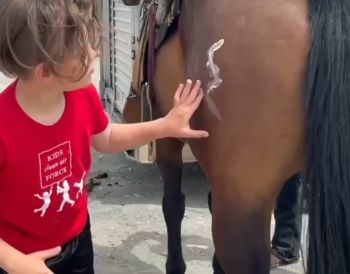 Painting a horse in preparation for the day's events. Credit: Save Thacker Pass |
(LOS ANGELES, Calif.) - It wasn’t much more than a month ago that I interviewed Shelley Harjo. A Paiute Shoshone mom and recently appointed Tribal Council member at Fort McDermitt, Shelley has had doubts about Lithium America’s gigantic Lithium open pit mine at Thacker Pass, nearby.
 Shelley Harjo1 |
The series inspects the rhetoric and the reality behind America’s thirst for Lithium to power batteries for electric vehicles, and rechargeables of all types from your toothbrush to mobile phones, laptops and all connected devices and tools.
Here, Shelley takes us behind the scenes to reveal the pressure her community is feeling to accept the terms of agreement handed to them by the company, requiring non-disclosure (Gag Order) in exchange for community “benefits” that may be a blessing or a curse. It is here, a story told.
Exclusive Interview with Shelley Harjo
Robert Lundahl: Fort McDermitt Paiute-Shoshone Indian Reservation, NevadaThe Fort McDermitt Paiute and Shoshone Tribe is a federally recognized tribe of Northern Paiute and Western Shoshone peoples, located at McDermitt, Nevada and Oregon.
The Fort McDermitt Indian Reservation spans the Nevada–Oregon border, in Humboldt County, Nevada and Malheur County, Oregon, near the Quinn River, which runs through the Tribe's Nevada lands, east to west.
Shelley Harjo: My name is Shelley Harjo. I'm an enrolled member with the Fort McDermitt Paiute Shoshone tribe. I have been involved with or watching this issue of Lithium America coming to our area.
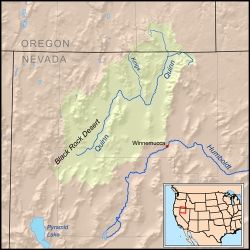 The Quinn River drainage basin2 |
I was recently appointed into a seat on the Tribal Council in May of this year, 2023. I had worked for the Reno Sparks Indian Colony close to 18, 19 years total.
They were involved with the protection of sacred sites because they're one of the few tribes in Nevada that has a THPO office (Tribal Historic Preservation Office), so they asked me what my thoughts were on the Thacker Pass issue. So I gave them my thoughts, knowing it would be good to create an allyship between the tribes.
Robert Lundahl: Prescient today is the fact that by 1858 the Indians and Whites had agreed to a treaty with the principle of equal justice for all. Thieves and killers, white or Indian, were to be turned over to the authorities.
Thereafter, Paiutes under Numaga fought alongside Whites against raiding parties of Pit River Indians from across the Sierra Nevada. For the next two years, the Paiutes and Whites lived in relative peace.
However, the winter of 1858 was especially harsh, making it impossible to get provisions or people over the Sierra Nevada. Food became scarce, forcing residents to hunt for wild game. A massacre by the Pit River people had left bodies scattered across the land.
Shelley Harjo: In the meantime I had understood that the Community Benefits Agreement was started with the tribe with Lithium America and so I have always been against the mine and so I thought, okay, I need to voice my concern because politically in McDermitt, on the Tribal Council we've had a lot of ups and downs, meaning a lot of infighting.
I knew that the Thacker Pass issue was going to be a big one at some point, so when the position came open I thought that would be my opportunity to voice the concern of some of the members who actually are against the mine.
I can give a different perspective to the sitting Council and hopefully come to an agreement on where we stand as a whole community in McDermitt. So that's kind of what's transpired previous to this.
Apparently there's been quarterly meetings with Lithium America and so for 2023, the quarterly meeting was held August 14th, I believe, which was this past Tuesday.
Since I live in Reno it's been hard to get back and forth. Because I've planted myself here in Reno for the last 30 years, the thinking of some of the people on the council and even some some of my own people, the membership, is that once you leave, your interest doesn't necessarily follow our interests because, it's presumed that we are not in touch with what's going on on the reservation.
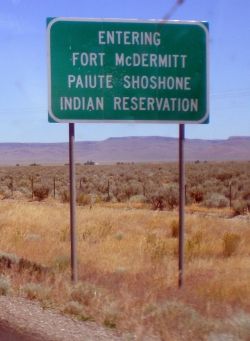 Entering Fort McDermitt Reservation3 |
Robert Lundahl: In 1936 the Indian reservation was established, when the tribe organized under the Indian Reorganization Act of 1934. The reservation has 16,354 acres in Nevada and 19,000 acres in Oregon. As of the 2010 census, 313 Indians lived on the reservation, with 42 enrolled members living in nearby McDermitt.
Shelley Harjo: However, in my case, well I guess in any case, anybody who lives off of the reservation, of course, we still expect that eventually when we die we're going to be buried with our people there, so that's the the belief that us off reservation people live by.
So I thought it was my opportunity again to get my voice out there along with the enrolled members who don't have that voice.
So the meeting happened, and I regretfully had to inform the Council I wouldn't be there because of personal issues. This would have been my first quarterly meeting as a sitting Tribal Council member, so knowing the importance, I was very upset that I couldn't make it.
I got a few Community calls after the meeting which indicated that they're pushing forward. They want to continue, and it's the consensus of the council to continue working with Lithium America.
There were community people in the audience who were in opposition, however, you know, when we're elected officials we are the voice of the people so with my voice not being there, that voice was left out that day.
The opposition side has always kind of just been swept under the rug because our Council believes that this is the right thing to do. You know, sign that agreement and hopefully we can get some kind of monetary assistance to help us with infrastructure on the reservation, so that's kind of the push.
We are a poor tribe. We rely on government grants and 638 contracts, so there really is no Economic Development there, as far as you know the tribe making their own money. So it's just, in my eyes, a lose-lose situation. Because we're looking at the money, which the rest of the world is also looking at, and the benefits of "Green Energy."
We're sacrificing our future and our children’s future and so that's my belief. Our people weren't heard that day.
Robert Lundahl: The Fort McDermitt Military Reservation was established 14 August 1865 at the former site of Quinn River Camp No. 33 and a stagecoach stop, Quinn River Station, in what was a traditional seasonal homeland of the Paiute, Shoshone and Bannock peoples.
Originally, the fort was established to protect the stagecoach route from Virginia City through Winnemucca, Nevada to Silver City, Idaho Territory.
It was named after Lt. Col. Charles McDermit, commander of the Military District of Nevada, who was killed in a skirmish in the area in 1865. Of several skirmishes or attacks by colonial forces including The First Nevada Cavalry in the same year, murders were between 30 and 70 predominantly women and children.
Their records and remains were recorded by the EIS for Lithium America's development/destruction of the lands for a Lithium mine with little compensation and no direct reparations.
When the military outpost was closed in 1889, the Military Reservation was adapted as the Fort McDermitt Indian Agency, betraying its original purpose.
Shelley Harjo: In the community benefits agreement- it's a confidential agreement, so I really can't say too much other than what has been disclosed already, which was they were to build us a community building, which would assist with our child care.
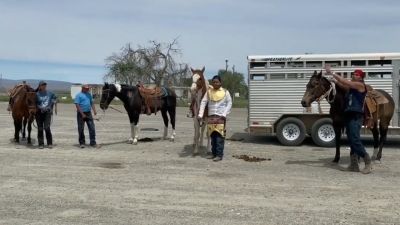 |
We do not have a current Child Care Program and that's one of the issues of the reservation. We have working parents. They have to leave their kids with family or sometimes they just refuse to work because they don't have child care.
They also wanted to give us a cultural center, and then a greenhouse where we could grow our medicinal plants that they will be tearing up in the land. So to me, you know, that's not sufficient. I've always been against the benefits agreement and it's money. You can't buy our future and so that's what I see it as.
I'm speaking today on behalf of my own personal beliefs and not necessarily the Council. I was disappointed that Lithium America is pushing that they're working with the tribe to give us what we need.
It's an agreement you know but one of the disclosures in the agreement is we cannot say anything negative about Lithium America, being on the council, or it nullifies the CBA, as they call it.
I don't know if all the the people truly understand the legalities of the CBA, or the implications of having the CBA, meaning, they come in and they wave the green money in front of us, and we have no money, so they, you know, they're basically using us to to push forward their initiative of extracting minerals so I don't know if a lot of tribal members know that. So the concern is education for the community.
I think it's more or less a gag order, just in general, do not talk about anything but just give us your green light to basically take whatever we want from your sacred land.
We can barely keep our own current buildings operating, so if they're going to build us an eight thousand square foot building that's gonna assist us, how are we gonna manage to keep a big building operating?
You know it takes a lot more than just giving us a building that's going to depreciate in five to ten years and we're stuck with the same destruction that we were before.
I believe there was a court case in Arizona that said if the government didn't have the rights or or the company did not have the rights to the land where they supposedly are going to put the tailings, then you know it wasn't a doable project.
However, we found that the company did not have claims on that or permission from BLM, yet (Judge Miranda) Du approved it to go ahead and move it forward, so you know that's the biggest issue I see is our little tribe is having.
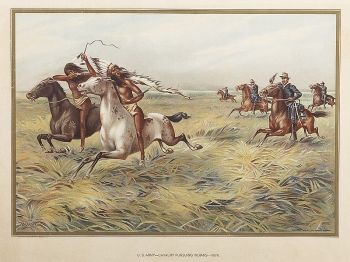 U.S. Cavalrymen pursuing American Indians4 |
We don't have money for a lawyer. We don't have money to go out and find people that are going to help us in this, so I think the best option- I've heard the Chairman say, is the news media. Or, we might as well take what we can get, but I just feel like that's not the right way to go because we're talking about our grandchildren and great grandchildren's future.
We don't know what these tailings might do, or do to us internally, as far as breathing this stuff in, all this sulfuric acid that will be in the air.
There's just so many, many reasons why we shouldn't be allowing this, and you know, for the tribes to try and fight the government over land that has always been ours, it is not right you know, we shouldn't have to.
I mean there's at some point there's a trust responsibility for the government to take care of the First Nations people and they have not. They have yet to do that.
We're the first people of this land and we have no rights when it comes to the land. I mean, it was stolen from us and the government has admitted to that but yet we have no protection for even our religion, our right to religion, so I don't know how to make that point more clear.
We can protect the Trout and the Sage Grouse, there's more protection for those than there is for Native people in general. You know, it’s disheartening because like I said, we're the First Nations people.
The government can protect Muslims and Jews and Christians and, you know, sexual orientation, but when it comes to Native American rights and spiritual rights and freedom to practice our religion, we're not protected.
We're what, one percent of the whole United States. They tried to get rid of us and we're still here but we're fighting the bigger battle, because you have movements like Black Lives Matter, and when it comes to MMIW (Murdered and Missing Indian Women), and Native issues, you don't hear about them, so the Inequality of Justice- it has to change.
There was a point where the government was trying to kill us off, and so I think they tried their hardest, like with the Longest Walk, there was a walk way back in, there were just so many opportunities for them to try and get rid of us, and they failed.
They even tried, and I think with this issue of Ox Sam, was when they were trying to round us up and send us on to Yakima, Washington, and Idaho and all these other places so it's always been my opinion that just because I'm on the Fort McDermitt reservation and I was born there doesn't mean that that's where my original people were.
 Fort McDermitt Reservation in March 19405 |
It doesn't mean that Reno Sparks people don't belong in that area; it doesn't mean that Burns people don't belong in our area and that's what the general public doesn't understand.
We, as Paiute people, we’re all over the West. So when a company like Lithium America comes in and says, we're following all our state laws and federal laws to get the approval of the people, but they only went to our tribe, and they went to our tribe when there was COVID, and I believe they sent letters in 2021, saying they didn't hear from us. Well, in July of 2021 until I would say mid-september, our tribe was going through COVID.
I actually had to bury my brother in August, due to COVID. He had cancer and died of COVID. He got the virus. Although he was on hospice he went home and got sick because, I believe at that time there were over 50 tribal members on the reservation who were sick.
The administration was closed. Our government was closed.
So it's always been, "I thought that the Native people, are only in their little areas of their reservation," but I think that's what the government set up for us, herd them all out like cattle and wherever they are, that's where they're going to be counted, and then they stay in their little corrals.
And I use that analogy because you know we've got a lot of ranchers in our area, a lot of the ranching mentality is in our area, and the reason why I bring this up is because when they did the walk, you know, people died all along those walks to Washington and Oregon and Idaho, and so Lithium America, this foreign company, does not understand.
Even the general public doesn't understand how Native people went to the resources. We gravitated towards the resources, the land resources, based on the season.
When these companies come in, it's just, in my opinion, a modern day genocide that's still occurring from way back when. I don't understand why we're a target, or maybe not even a target, but just- the government has always tried to get rid of the Savage Indian and I guess we're still seen as that. So I don't, I don't have an answer for that.
It's really difficult to live in modern day society and have people understand our culture and understand why we're so connected to the land, because there's people who say, what's a rock? or what's that weed? and to us those are things that really mean a lot.
I mean we use the rocks and ceremonies, several different ceremonies, we use the medicines.
A lot of our people, when they had COVID, during that time, they went to the hills and and got the medicines to help people get over COVID, so there's a lot of things that happened and are still happening, and whether it's in our religion or traditions, our cultures; it's still happening and people don't understand that.
When you're in it, when you live it, it's just Who You Are.
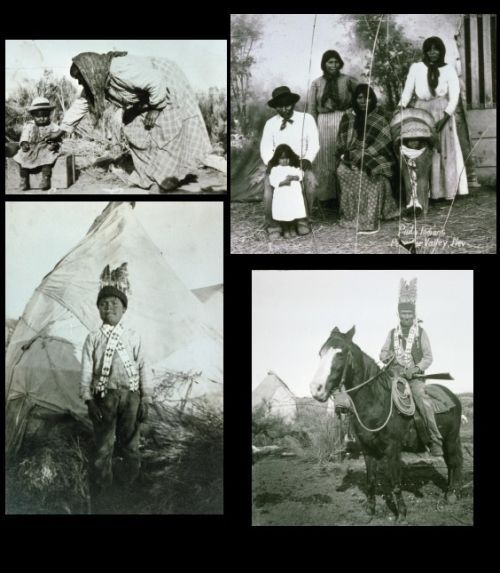 Historical shots of Paiute Indians7 |
When you look at Oak Flat they're in almost the identical situation, but I think the way that theirs went, and correct me if I'm wrong, but it was a land transfer that went through on a bill.
There was a rider that had to pass and so that's how the land transfer went, but you know they've been fighting this, I guess a little bit longer than we have, but you know... what do we do?
I don't know.
Lithium America and any other foreign company mining for minerals is a foreign country and you know, I know the government says we need to stay away from other countries.
We're at the mercy of the other countries because they mine and that's where we get our minerals from. That's why they want to mine domestically but, you know, on the backs of our people.
They put us on these desolate lands thinking these are worthless areas and then when they find their mineral then you know again it doesn't mean anything to them- but it means something to us.
Whether we're there voluntarily or not, it means something to us, but to them it's, you know, they could dig seven thousand feet into the dirt, and not give a world about it. They could care less.
My perspective is although I can see the benefit of an electrical vehicle, however, you know when some of these batteries overheat, there's no way to fix it. People have been locked in their cars because their batteries malfunctioned in their Teslas.
So when you have a bad battery, how do you recycle that? I know they're working on that but how do you recycle that?
So when you talk about electric vehicles you know you have to have an electrical grid. And if you want to push that initiative, where are we going to get all that electricity?
You're poking holes in Mother Earth whether it's for water, whether it's for lithium, whether it's for copper, but in essence what are we doing? We're poking holes in the earth that sustains our life.
I would ask people to think about the grid. Think about your grandchildren, your great-grandchildren, you know because a mineral can only last so long. Once we start digging more and more into Mother Earth, we're digging into her heart, her Water Resource that gives us life.
Life isn't going to be anymore.
We have to trade something for something, you know one thing for another, life or a car.

The people of the state of Nevada who are pushing for this green energy, the people of the United States, the people of any area going through this need to think about the future. What are the pros and the benefits, because, at the end of the day, the clean energy laws, clean water, those don't really protect in the long run.
When we signed that benefits agreement we weren't thinking about the tailings in the air; we weren't thinking about maybe one of these trucks on the highway gets a flat tire and hits one of our tribal members.
I had an aunt who was killed on Highway 95 where they'll be transporting. She was killed by an RV that had a blowout. I mean we're not even thinking of those things about the protection of our people.
So those are my concerns and the reason why I'm against this mine- and there are many more to come. There are so many mining claims within the area of McDermitt it's ridiculous.
We're a small rural tribe and we have a small area that we call home, and you know, we're getting bombarded by all these foreign companies who want to come and drill in our backyard.
We've got to think outside the box, think of our grandchildren, you know, what are these tailings going to do to our lungs? They expect this to go on for 50 years and another 50 for a reclamation, and you know to me that's too long and I don't know if our lives can handle all this.
We don't know the effects until they happen. I try and be a forward thinker and think about the people.
We have a Mercury mine outside of the town of McDermitt and a lot of our people work there and a lot of them got cancer, a lot of them have died. A lot of people lost their teeth because of the sulfuric acid in the air, so I don't know if our people really understand the health risk.
We've got another mine that's come in and they're from Australia and I think they (want) an additional water well to be drilled. So that's tapping into our water. At the McDermitt reservation in the last month, and we've had a water shortage where we've had to shut down our tribal clinic because you can't see a patient if you don't have water. There's so many issues, we need to focus our efforts on something that means something, rather than money in a building.
Robert Lundahl: Thank you, Shelley.
WATCH THE VIDEO (Shelley Harjo Dissident):

Fort McDermitt Paiute-Shoshone Indian Reservation, Nevada6
[Note: Transcript Edited by Bonnie King, Salem-News.com for ease in readability.]
CREDITS:
1 :Harjo image & graphics. Credit: Robert Lundahl
2 : Map showing the Quinn River drainage basin — in northern Nevada and southeastern Oregon. Credit: Kmusser, Wikipedia
3 : Road sign entering Fort McDermitt Paiute-Shoshone Indian Reservation on US-95 north. Photo: Zach, Flickr
4 : An 1899 chromolithograph of U.S. Cavalrymen pursuing American Indians.
5 : A pair of unidentified men repairing a fence on the Fort McDermitt Reservation in March 1940 - image - Arthur Rothstein, Library of Congress.
6 : Fort McDermitt Paiute-Shoshone Indian Reservation, Nevada. The Fort McDermitt Paiute and Shoshone Tribe is a federally recognized tribe of Northern Paiute and Western Shoshone peoples, located at McDermitt, Nevada and Oregon. Credit: Ken Lund, Flicker
7 : All other historical: Paiute Indians Library of Congress
ALSO : Drone shots, bulldozer and graphics, Young Warrior, Horses, kids and people. Credit: Protect Thacker Pass
SERIES ARTICLES:
- Sep-11-2023
Dorece Sam: SLAPP Suits and Dirty Deals
http://www.salem-news.com/articles/september112023/dorece-sam-slapp-suits-rl.php - Aug-14-2023
Chasing the American Dream in Lithium Valley
http://www.salem-news.com/articles/august142023/american-dream-lithium-valley-rl_.php - July 19, 2023
New Series on KPFK Features Voices of Land Defenders and Environmental Justice Advocates
http://www.salem-news.com/articles/july192023/creative-frontline-lundahl.php#video - Jun-28-2023
What Do We Mean by Environmental Justice? A Legacy of Greenaction
http://www.salem-news.com/articles/june282023/greenaction-environmental-justice-rl.php#video - Jun-03-2023
Thacker Pass, An Archaeological Perspective
http://www.salem-news.com/articles/june032023/thacker-pass-archaeological-rl.php#video - May-24-2023
The Fight to Save Thacker Pass
Peehee Muhu: Rotten Moon
http://www.salem-news.com/articles/may242023/will-falk-thacker-pass-rl.php#video - May-03-2023
Oak Flat: The Story Behind the Story
Mahlee Yellowfeather, Great Granddaughter of Geronimo
http://www.salem-news.com/articles/may032023/oak-flat-geronimo-rl.php#video - Apr-13-2023
The Land You Know Has Been Given to You
http://www.salem-news.com/articles/april132023/the_land_you_know-rl.php#video - "Who Are My People?" Television documentary by Robert Lundahl
https://www.youtube.com/watch?v=zWJMLYi0iGs
Articles for October 7, 2023 |


Quick Links
DINING
Willamette UniversityGoudy Commons Cafe
Dine on the Queen
Willamette Queen Sternwheeler
MUST SEE SALEM
Oregon Capitol ToursCapitol History Gateway
Willamette River Ride
Willamette Queen Sternwheeler
Historic Home Tours:
Deepwood Museum
The Bush House
Gaiety Hollow Garden
AUCTIONS - APPRAISALS
Auction Masters & AppraisalsCONSTRUCTION SERVICES
Roofing and ContractingSheridan, Ore.
ONLINE SHOPPING
Special Occasion DressesAdvertise with Salem-News
Contact:AdSales@Salem-News.com
Salem-News.com:


Terms of Service | Privacy Policy
All comments and messages are approved by people and self promotional links or unacceptable comments are denied.
[Return to Top]
©2025 Salem-News.com. All opinions expressed in this article are those of the author and do not necessarily reflect those of Salem-News.com.